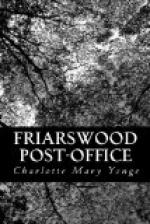He was not a man of many words, and nothing passed for a long time but shouts of hoy, and whoa, and the like, to the horse. Paul went heavily on, scarce knowing what he was about; there was a stunned jaded feel about him, as if he were hunted and driven about, a mere outcast, despised by every one, even by the Kings, whose kindness had been his only ray of brightness. Not that his senses or spirits were alive enough even to be conscious of pain or vexation; it was only a dull dreary heedlessness what became of him next; and, quick clever boy as he had been in the Union, he did not seem to have a bit more sense, thought, or feeling, than John Farden.
John Farden was the first to break the silence: ‘I wouldn’t bide,’ said he.
Paul looked up, and muttered, ‘I have nowhere to go.’
‘Farmer uses thee shameful,’ repeated John. ‘Why don’t thee cut?’
Paul saw the smoke of Mrs. King’s chimney. That had always seemed like a friend to him, but it came across him that they too thought him a runaway from prison, and he felt as if his only bond of fellowship was gone. But there was something else, too; and he made answer, ‘I’ll bide for the Confirmation.’
‘Eh?’ said John, ‘what good’ll that do ye?’
‘Help me to be a good lad,’ said Paul, who knew John Farden would not enter into any other explanation.
‘Why, what’ll they do to ye?’
‘The Bishop will put his hand on me and bless me,’ said Paul; and as he said the words there was hope and refreshment coming back. He was a child of God, if no other owned him.
‘Whoy,’ said Farden, much as he might have spoken to his horse, ’rum sort of a head thou’st got! Thee’ll never go up to Bishop such a guy!’
‘Can’t help it,’ said Paul rather sullenly; ’it ain’t the clothes that God looks at.’
John scanned him all over, with his face looking more foolish than ever in the puzzle he felt.
‘Well,’ he said, ‘and what wilt get by it?’
‘God’s grace to do right, I hope,’ said Paul; then he added, out of his sad heart, ’It’s bad enough here, to be sure. It would be a bad look-out if one hoped for nothing afterwards.’
Somehow John’s mind didn’t take in the notion of afterwards, and he did not go on talking to Paul. Perhaps there was a dread in his poor dull mind of getting frightened out of the deadly stupefied sleep it was bound in.
But that bit of talk had done Paul great good, by rousing him to the thought of what he had to hope for. There was the Confirmation nigh at hand, and then on beyond there was rest; and the words came into his mind, ’There the wicked cease from troubling, and there the weary are at rest.’




